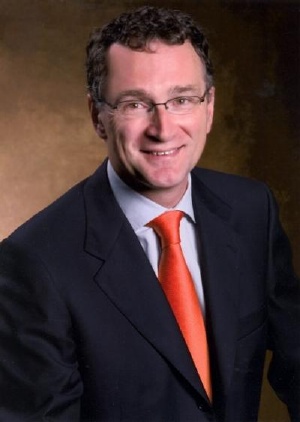May 12 2009
When a spacecraft launches from Cape Canaveral, Fla., in the future, its cargo will include a small box containing a nano-fluidics experiment designed by scientists at The University of Texas Health Science Center at Houston.
 Mauro Ferrari, Ph.D., is the nanomedicine division director at the University of Texas Health Science Center at Houston. Credit: Center for NanoMedicine Research at The University of Texas Health Science Center at Houston.
Mauro Ferrari, Ph.D., is the nanomedicine division director at the University of Texas Health Science Center at Houston. Credit: Center for NanoMedicine Research at The University of Texas Health Science Center at Houston.
Investigators in the laboratory of Mauro Ferrari, Ph.D., nanomedicine division director at The UT Health Science Center at Houston, won a nationwide Microgravity Research Competition and with it the opportunity to test a research project aboard an extended flight of a SpaceX Falcon 9 rocket and Dragon spacecraft.
When sensors inside the box determine that near weightlessness has been achieved, the experiment will activate itself and begin a series of tests designed to learn more about the diffusion of micro nanoparticles through tiny microchannels measured in millionths of a meter, said Alessandro Grattoni, experiment project manager and senior research assistant in Ferrari's lab.
Results of these experiments could aid in the development of implantable devices for controlled, long-term drug release. This research could yield important treatment means for illnesses, including cancer, said Grattoni, a Turin, Italy, native, who will receive his doctorate in biomedical engineering in May.
"I am delighted with this historic opportunity to perform research in space and bring back the results to Earth to improve health care," Ferrari said. "This experiment will allow us to refine our technologies for the release of a drug at the right time and to the right place in the body, and to bring to the clinic the vision of personalized medicine."
The competition was sponsored by The Heinlein Prize Trust, SpaceX (Space Exploration Technologies) and the Rice Alliance for Technology and Entrepreneurship. The trust is named after the late science fiction writer Robert Heinlein.
"World class experiments from The University of Texas Health Science Center at Houston teamed with the first cost effective laboratory in outer space from SpaceX will begin a new era of medical research for the 21st century. The commercial and health benefits to all of us will be immense," said Art Dula, trustee of the Heinlein Prize Trust.
In addition to the opportunity to test their experiment aboard SpaceX's Dragon spacecraft, the UT scientists received $25,000 and a trip to see the launch at Cape Canaveral. The proposal is titled "Decoupling Diffusive Transport Phenomena in Microgravity."